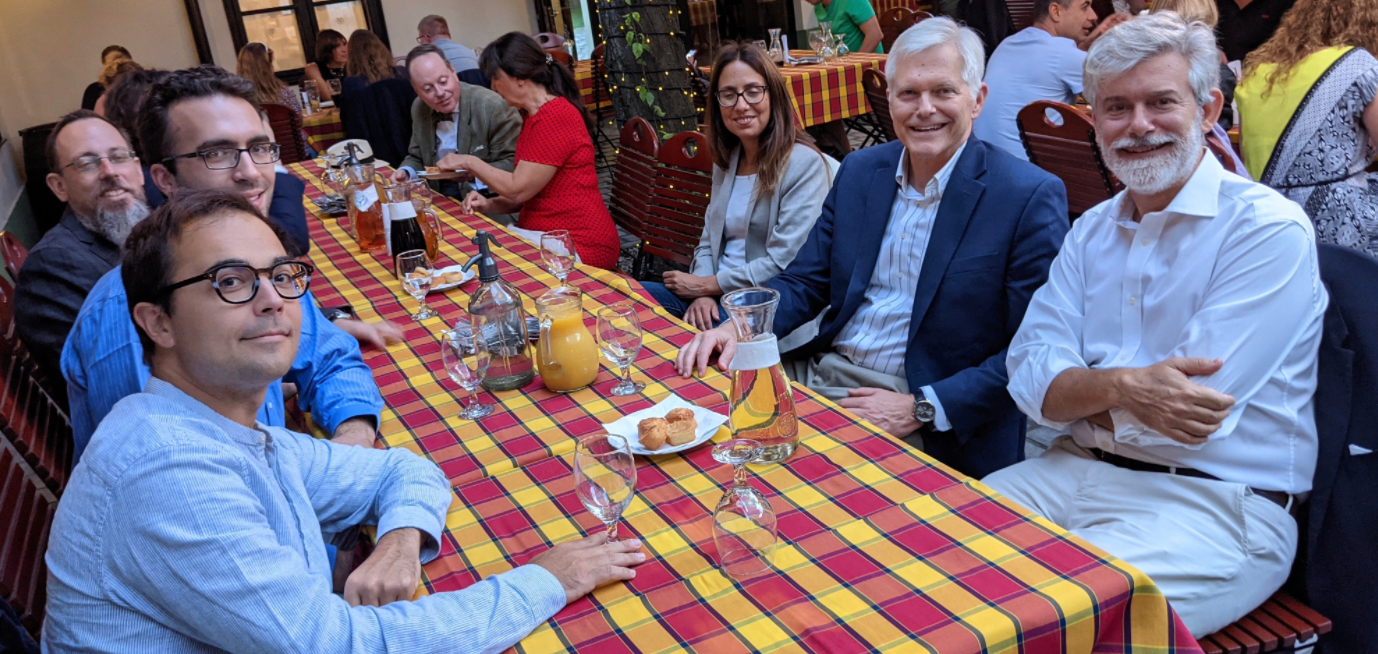“It turned out to be the happiest accident of my graduate school career,” said Hahn, a doctoral student in philosophy at the Graduate School of Arts and Sciences.
The conference was organized last fall by the Institute for Hungarian Research‘s Research Center for the History of Ideas and Fordham philosophy professor Gyula Klima, Ph.D., who serves as director of the center. The event took place in Budapest, Hungary, where Klima gathered with scholars from institutions worldwide to deconstruct the concept of the Eucharist—or, as the conference website calls it, “the most mind-boggling sacrament of the Christian faith.”
“We were all united around a very specific thing—the metaphysics and theology of the Eucharist, which is the most niche thing you can think of,” said Hahn. “If you look at it from an ordinary American secular perspective, the Eucharist is extremely weird. You have food, which is supposed to be the body and blood of a Palestinian Jew who lived 2,000 years ago. He’s supposed to be here, physically, and have an effect on people who join together in his mystical body, or the Church. That is an extremely weird idea, but it’s also extremely interesting. And it’s something that was the life of a continent for centuries.”
Beginning in the 14th century, some scholars started reinterpreting the possibility of this “supernatural change” that is said to take place during Roman Catholic Mass. However, this caused huge conceptual tensions within the theological and metaphysical system, said Klima. Essentially, there was a battle between the “old” and “new” ways of doing philosophy, logic, science, and theology, he said.
“These ideas caused incremental changes—tiny, almost invisible conceptual changes—that eventually led to different belief systems and religious wars,” said Klima, adding that these clashes also paved the way for modern philosophy and science.
Klima said their meeting in Budapest was so successful that he decided to establish an organization that would continue their dialogue every year. Toward the end of the conference, he founded the Society for the European History of Ideas (SEHI, pronounced “see-high”), an international network of scholars who study the European history of ideas—both within and outside Europe.
“The essence of European thought is taking Greek forms of thinking and philosophical structures and combining them with Judeo-Christian content,” Hahn explained.
Late Night Conversations About Life and Beyond
There are currently 43 members, including scholars from Harvard University, University of Notre Dame, the University of Oxford, University of California, Los Angeles, and many other academic institutions around the world, said Klima. Membership is open to faculty and graduate students from all academic institutions, as well as other scholars who are interested in their work.
“We are interested in the spirit of the times and the ways people live, and how these change each other over time. We are focusing on Europe because of the role of European culture in starting modernity on a global scale,” said Klima, who also founded the Society for Medieval Logic and Metaphysics in 2000. “European culture has had an enormous role on the world stage, especially in American culture. However, Europe also needs to be understood in tandem with other cultures and continents.”
The Society for the European History of Ideas meets once a year to discuss each member’s individual research on a specific topic related to theology and metaphysics, as well as other fields like art, technology, and the sciences. They present their findings, exchange ideas, and compile a volume of their collective work on the annual theme.
Hahn said that he loved the support and sincerity shared by the scholars at the first conference, especially their late night debates.
“I stayed up late at night, having conversations with people I barely knew until the conference. We shared wine and cigarettes and talked about things like the classic question—if God exists, why is there evil in the world—and the politics within the countries where we live,” said Hahn, whose presentation focused on how Lutherans interpret the Eucharist.
Studying ‘What It Means to Be Human’
The next meeting will be held this summer in Lisbon, Portugal, where the society will consider the classic chicken and egg question in relation to metaphysics and theology. What drives large-scale conceptual changes: changing metaphysical intuitions or the reinterpretation of theological principles?
Fordham student Matthew Glaser, GSAS ’24, said he hopes to participate in the next conference. His interest in philosophy stems from the same curiosity that many of his colleagues share.
“I became interested in philosophy through a lot of conversations with high school friends around campfires, talking about politics, society, social issues, and these big-picture, abstract questions about how we should live and how to solve these problems. Through that, I found my way into philosophy and an interest in questions about human nature—about what it means to be human,” said Glaser, a Ph.D. student in philosophy who recently joined the society.
He said he joined SEHI because it informs our understanding of who we are today.
“One big part of American history is European history, especially the cultural and intellectual movements in Europe that led to the Reformation and the Enlightenment, and had a real big impact on our founding fathers and on the formation of the United States,” Glaser said. “If we want to understand our identity as Americans or people in Western culture today, I think it’s important for us to understand the history of our culture, particularly the intellectual history—to see where our modern ideas of freedom, individuality, democracy, and society come from, and on the flip side of that, to see how that’s changed over time.”


